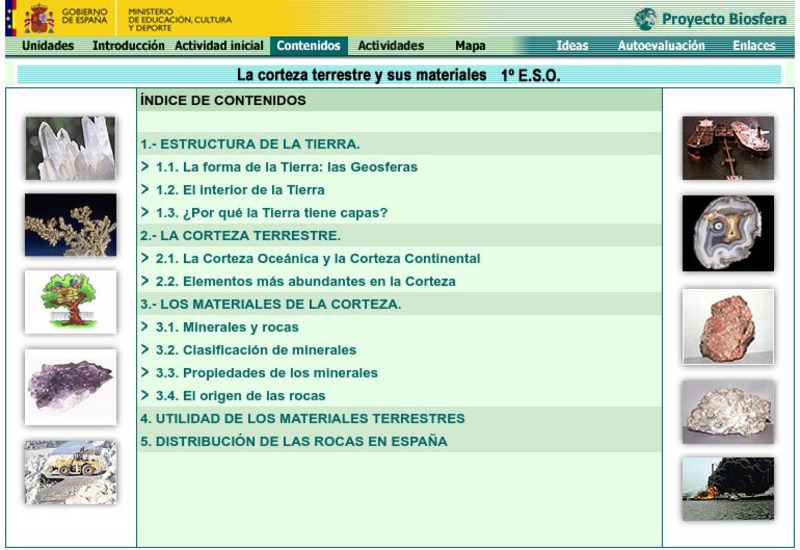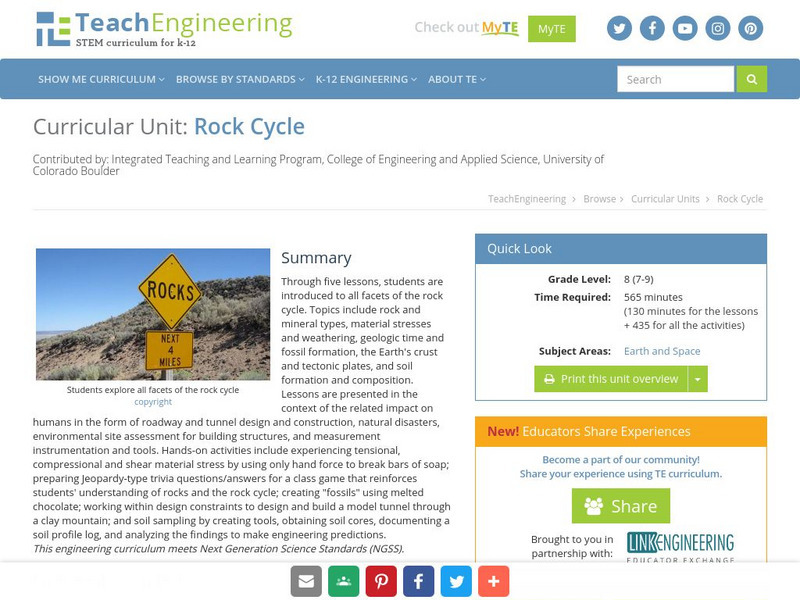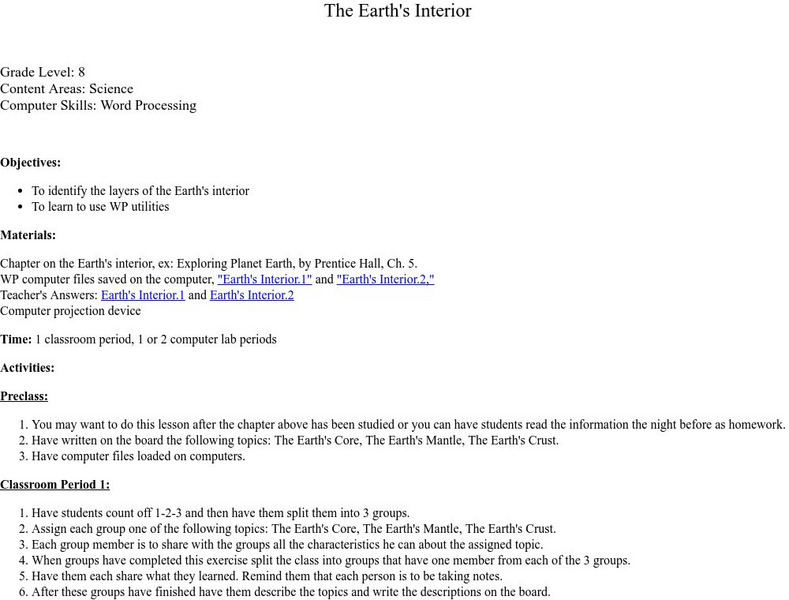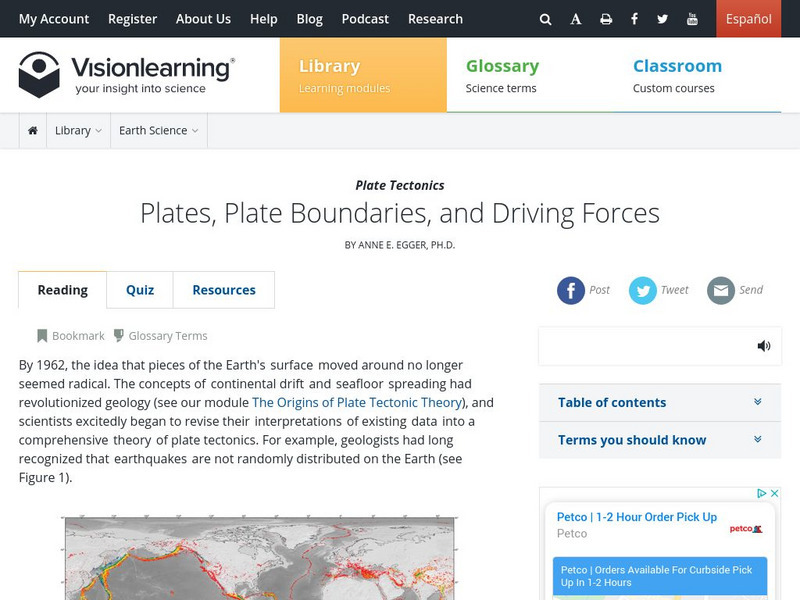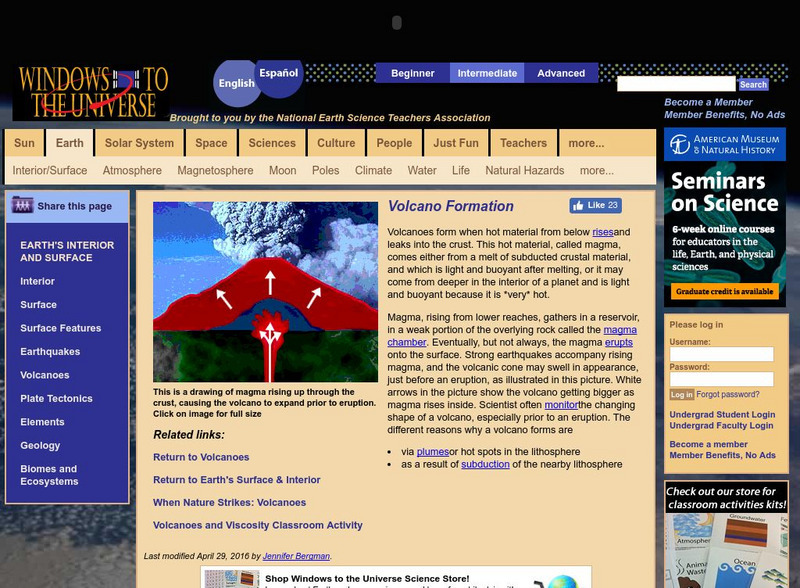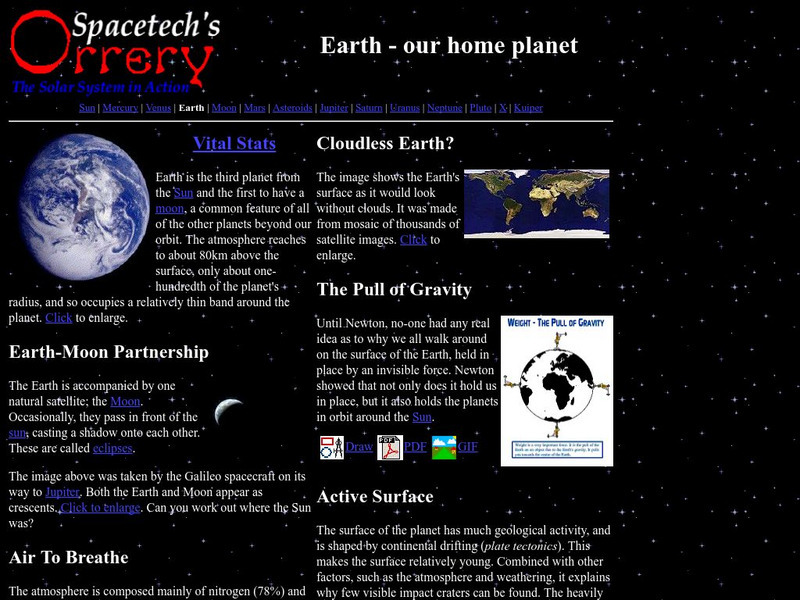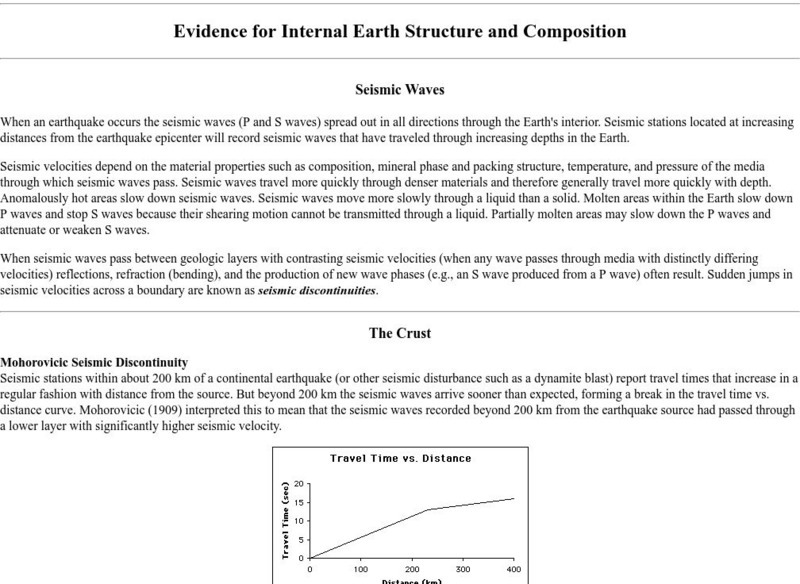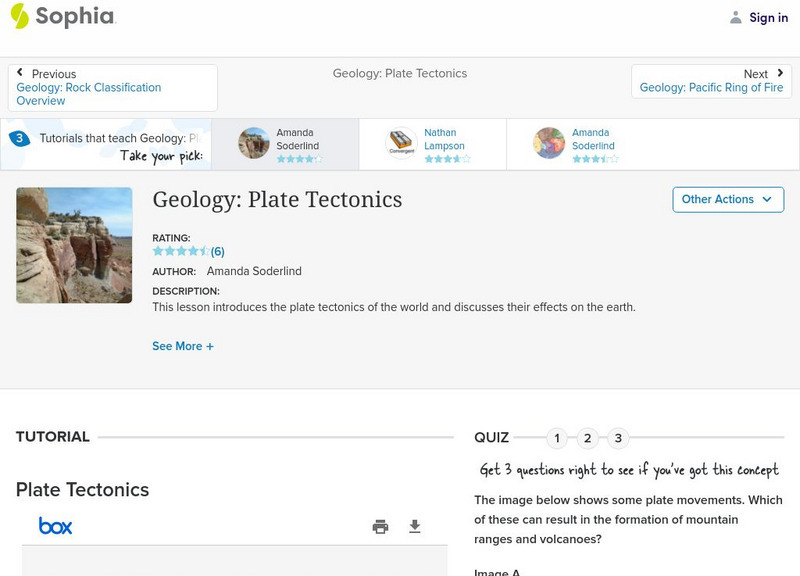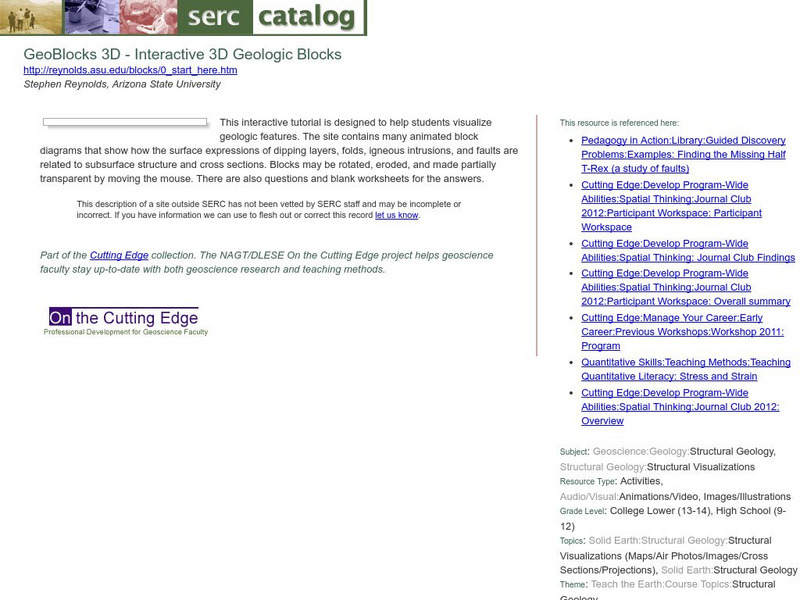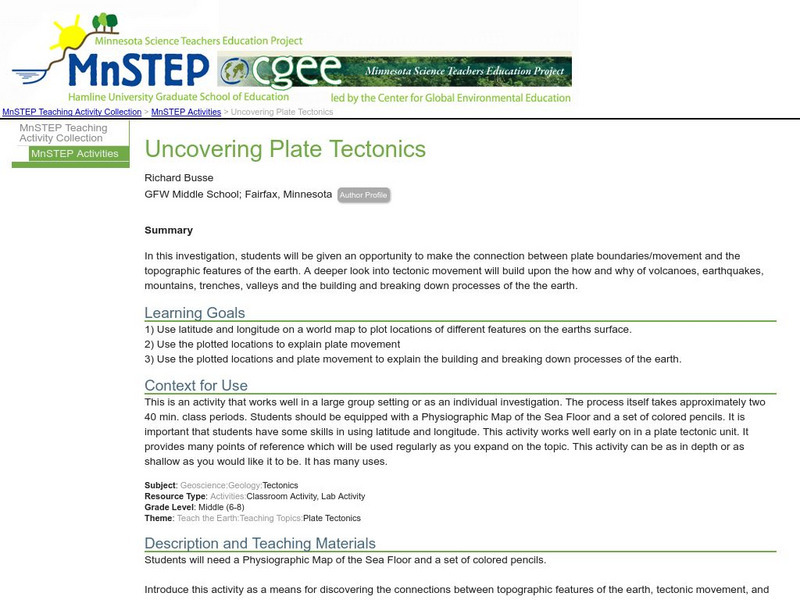Hi, what do you want to do?
National Institute of Educational Technologies and Teacher Training (Spain)
Ministerio De Educacion: La Corteza Terreste Y Sus Materiales
In this site learn about the structure of the Earth, the Earth's crust, and the usefulness of the earth materials. It contains many illustrations and 15 interactive activities.
TeachEngineering
Teach Engineering: Rock Cycle
Through five lessons, students are introduced to all facets of the rock cycle. Topics include rock and mineral types, material stresses and weathering, geologic time and fossil formation, the Earth's crust and tectonic plates, and soil...
ClassFlow
Class Flow: The Layers of the Earth
[Free Registration/Login Required] The lesson teaches fifth grade students about the 4 layers of the Earth. Characteristics of each layer are presented. The lesson incorporates video, student participation, and Activote assessment. The...
Smithsonian Institution
National Museum of Natural History: Paleobiology: Geologic Time: Hadean Eon
Journey into the past while reading this comprehensive overview of the Hadean Eon that covers topics such as the formation of the earth, its surface and atmosphere, fossil evidence, erosion and plate tectonics.
NC State University
North Carolina State University: The Earth's Interior
Improve understanding of word processing and knowledge of the layers of Earth's interior. Links to North Carolina State Standards.
Read Works
Read Works: Earth Science Pangaea
[Free Registration/Login Required] An informational text about Pangaea, the one continent that became the current seven continents. A question sheet is available to help students build skills in reading comprehension.
The Franklin Institute
The Franklin Institute: Earth Bowl
This activity from The Franklin Institute demonstrates the layers of the earth using gelatin, pudding, graham crackers, and a few other items. The students actually construct a representation of the earth that they can eat.
Vision Learning
Visionlearning: Earth Science: Plate Tectonics Ii: Plate Boundaries and Forces
Instructional module focusing on plate tectonics. Discussion includes plates, plate boundaries, and driving forces. Site also includes an interactive practice quiz and links relating to the topic.
National Earth Science Teachers Association
Windows to the Universe: Volcano Formation
Explanation of the factors that result in the formation of volcanoes, some basic but helpful animations and photographs.
Other
Spacetech's Orrery: Earth Our Home Planet
This site provides a very interesting overview of our home planet, Earth. Content includes a focus on the atmosphere, the pull of gravity, and the active surface.
Other
Impact Tectonics: Earth's Interior, Gravity, and Magnetism [Pdf]
Topics covered in this slideshow include the Earth's interior, seismic S- and P-waves, the crust and mantle, phase boundaries encountered by seismic waves, the Earth's internal heat, gravity and density, gravitational anomalies, the...
PBS
Pbs: Scientific American Frontiers: Earth on the Move
The interactive resource examines the plate tectonics, magnetic reversals, and continental drift of the Earth. An animation of the Earth's continental drift over the last 750 million years is included.
Michigan Reach Out
Michigan Reach Out!: Digging the Earth's Crust
Lesson plans from Michigan Reach Out! to help students understand the different soil types and what uses they would be good for.
Columbia University
Columbia University: Evidence for Internal Earth Structure and Composition
College-level research information describes how the movement of Earth's interior causes seismic wave activity.
Treehut
Suzy's World: Earth
At this site from Suzy's World and Suzy Cato, you can find out what the earth is made of and try an experiment.
Other
Bscs: Content Background Earth's Changing Surface
This is written to support and further your content learning about the dynamic nature of Earth's surface. The goal is for you to develop a conceptual understanding of landforms so that you will be able to more effectively teach...
US Geological Survey
Usgs: The San Andreas Fault
A great overall site that tells us about the San Andreas fault, where it is and what kind of movements have occurred. It then goes on to talk about earthquakes in general and their occurrences along fault lines.
Sophia Learning
Sophia: Geology: Plate Tectonics
An basic introduction to plate tectonics and the Earth's processes related to this phenomenon.
Incorporated Research Institutions for Seismology
Iris: Seismic Tomography [Pdf]
Learn how seismic tomography imaging helps scientists understand the formation of the Earth's interior.
National Institute of Educational Technologies and Teacher Training (Spain)
Ministerio De Educacion: Los Cambios en El Medio Natural I
In this unit you can learn about the internal structure of the Earth. It has 13 interactive activities.
Annenberg Foundation
Annenberg Learner: Earth and Space Science: The Geologic Timeline
Take this online quiz and test your knowledge of geological history, and the formation of our atmosphere, water, crust, oxygen, tectonic plates, Moon, and the rest of the Earth.
Science Education Resource Center at Carleton College
Serc: Geo Blocks 3 D Interactive 3 D Geologic Blocks
This interactive tutorial on visualizing geologic features contains animated block diagrams that show how the surface expressions of dipping layers, folds, igneous intrusions, and faults are related to subsurface structure and cross...
eSchool Today
E School Today: Landforms
Understand the formation and geology of different landforms around the Earth.
Science Education Resource Center at Carleton College
Serc: Uncovering Plate Tectonics
In this investigation, young scholars will be given an opportunity to make the connection between plate boundary movement and the topographic features of the earth.





